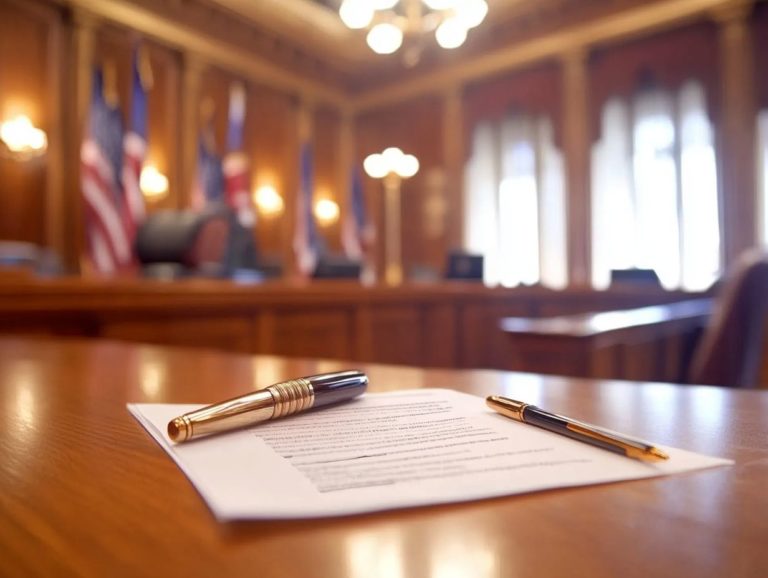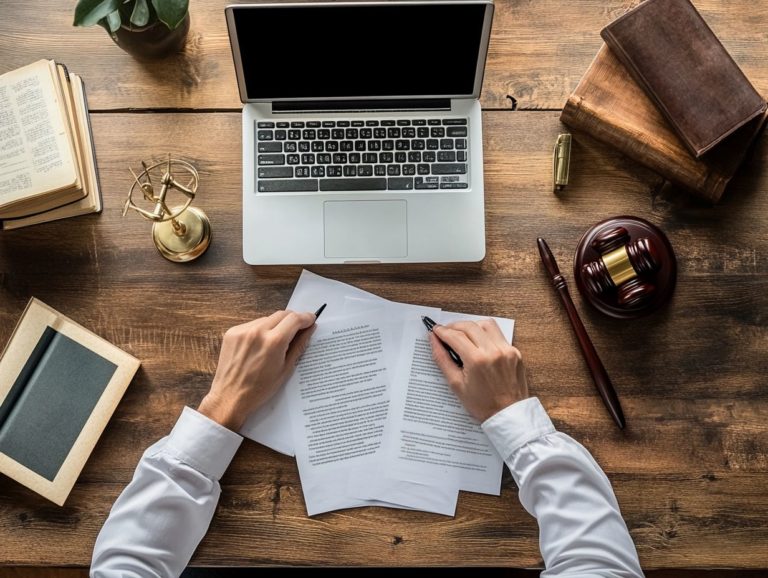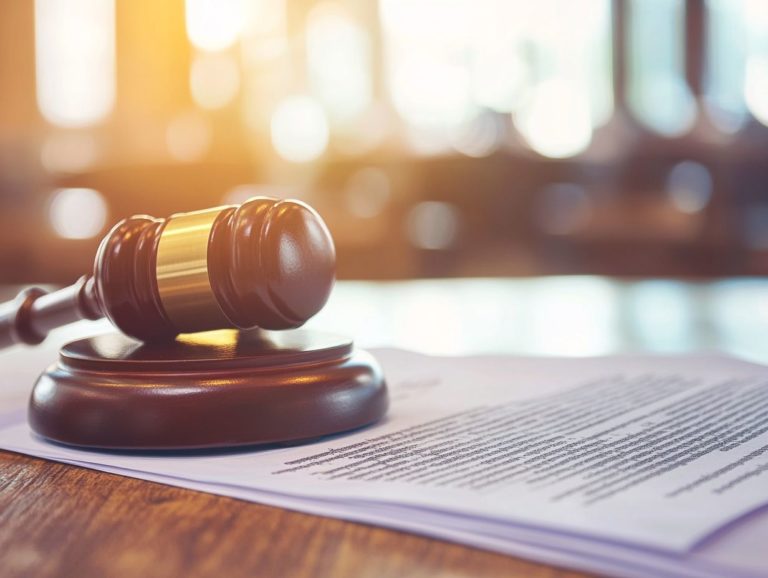5 Key Players in an IP Litigation Case
Intellectual Property (IP) litigation can feel like navigating a labyrinth, filled with various key players whose roles are pivotal to the final outcome. This guide explores the primary figures in an IP case, from the plaintiff and defendant to the patent owner and accused infringer, alongside their legal counsel.
It also outlines the procedural steps involved in an IP litigation case, explores potential outcomes, and discusses strategies for protection, common pitfalls, and the invaluable support that legal counsel can offer.
Whether you re a business owner seeking to safeguard your innovations or simply intrigued by the nuances of IP law, this resource will provide you with essential insights to navigate the complexities of the field.
Contents
- Key Takeaways:
- 1. Plaintiff
- 2. Defendant
- 3. Patent Owner
- 4. Accused Infringer
- 5. Legal Counsel
- What Is an IP Litigation Case and When Does It Occur?
- Frequently Asked Questions
- Who are the key players in an IP litigation case?
- What is the role of the plaintiff in an IP litigation case?
- What is the role of the defendant in an IP litigation case?
- What is the role of the judge in an IP litigation case?
- What is the role of the jury in an IP litigation case?
- What is the role of expert witnesses in an IP litigation case?
Key Takeaways:
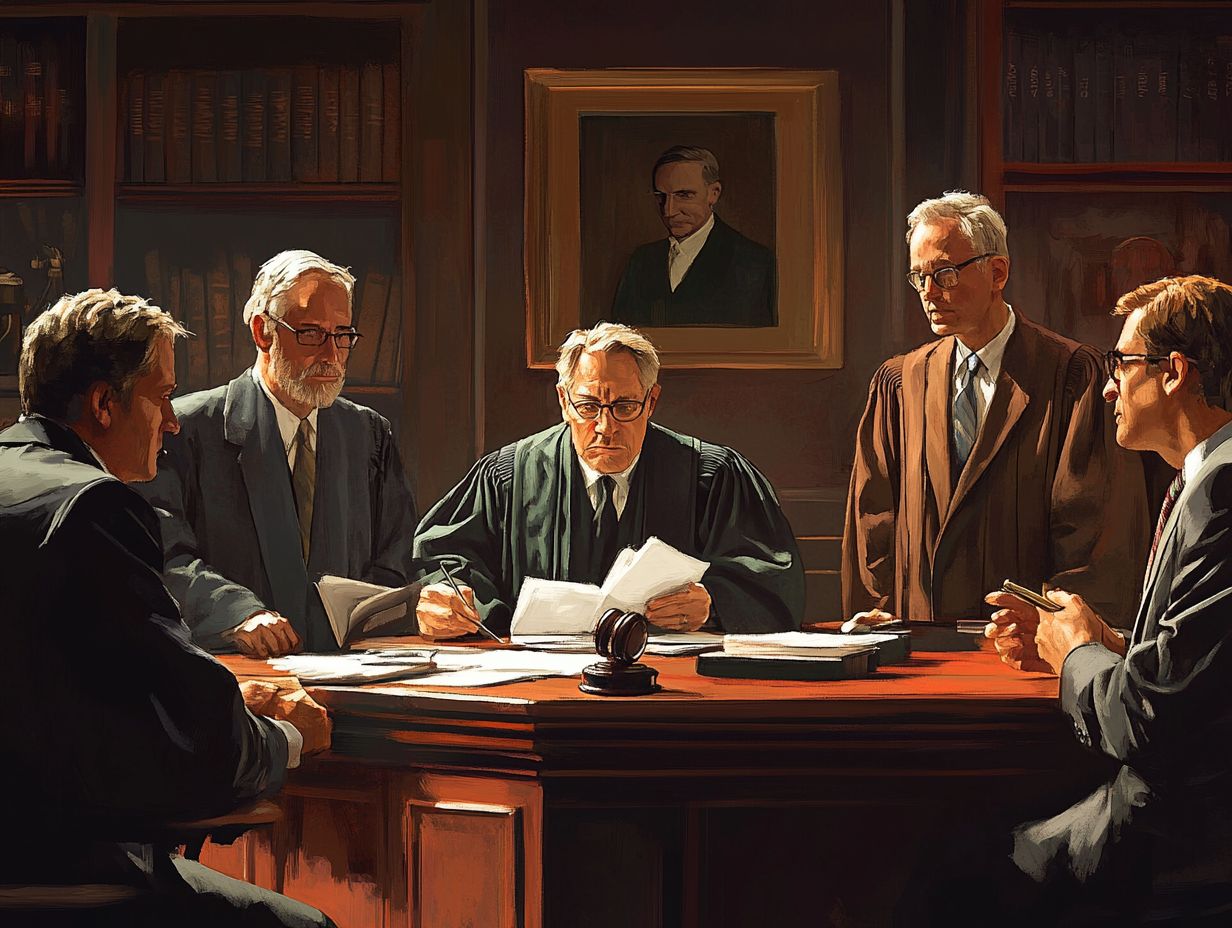
IP litigation involves a conflict between two parties over intellectual property rights. Understanding the 5 must-know terms in IP litigation is crucial, as key players in an IP litigation case include the plaintiff, defendant, patent owner, accused infringer, and legal counsel.
Steps involved in IP litigation include filing a complaint, discovery, trial, and potential appeals. To understand more about strategies, consider exploring 5 ways to leverage IP rights in litigation. Possible outcomes include damages, injunctions (court orders to stop certain actions), and settlements.
1. Plaintiff
In an IP litigation case, you become the plaintiff, the party that asserts exclusive rights over intellectual property. You re claiming that your patents, copyrights, or trademarks have been infringed upon by another entity.
This legal battle usually unfolds in a civil court. You seek remedies for the damages incurred from unauthorized use of your intellectual property, all in an effort to protect your economic value and maintain your competitive edge in the market.
As the one initiating the lawsuit, you carry the crucial responsibility of filing the infringement claims and compiling comprehensive evidence to back up your allegations. This means gathering essential documentation, such as product comparisons, licensing agreements, and expert testimonies that validate your claims.
Having legal representation is crucial. Attorneys will navigate you through the intricate legal landscape, ensuring that every procedural requirement is met. A successful outcome could lead to significant financial damages or statutory remedies (court-ordered compensation), not just compensating for your losses but also deterring future infringements by competitors.
This process reinforces the paramount importance of safeguarding intellectual property rights.
2. Defendant
In an IP litigation case, if you find yourself as the defendant, you are the individual or entity facing accusations of infringing upon the intellectual property rights held by the plaintiff. Understanding the key factors in IP litigation can provide valuable insights, as this could involve anything from patents to copyrights or trademarks.
In this high-stakes arena, it s crucial for you to meticulously prepare your defense to effectively counter the claims against you. This process often requires a thorough assessment of the plaintiff’s legal framework, where you ll scrutinize the validity of the intellectual property rights being asserted.
By challenging the originality or ownership claims, you can lay a solid foundation for your argument. Common defense strategies you might consider include:
- Invoking the fair use doctrine, a rule that lets people use some copyrighted material without asking for permission under specific circumstances, thus showing that your actions don t qualify as infringement.
- Compiling evidence to demonstrate that any alleged infringement was unintentional, highlighting the importance of showcasing genuine intent in legal disputes surrounding intellectual property.
Understanding these roles is essential for anyone involved in IP litigation. If you find yourself in such a situation, considering 5 tips for IP litigation success and seeking legal advice is crucial to protect your rights and navigate the complexities of the legal landscape.
3. Patent Owner
A patent owner is someone who enjoys exclusive rights granted by the U.S. Patent and Trademark Office, enabling them to control the commercial use of their patented inventions. This exclusivity provides a competitive edge and opens up licensing opportunities.
However, with these privileges come responsibilities, such as the need to actively enforce patents against unauthorized use.
The patent acquisition process is challenging. It requires thorough documentation, an examination of previous inventions or ideas that may affect your patent’s validity, and strict adherence to specific regulations, making it time-consuming and complex.
Once you secure your patent, it’s crucial to implement effective maintenance strategies, including timely renewals and vigilant monitoring for potential infringements.
When infringement occurs, pursuing legal action becomes essential to protect your rights, highlighting the economic value of your patents. Ultimately, owning a patent fosters innovation and shapes competitive dynamics within the market, often positioning you as a leader in technological advancement.
4. Accused Infringer
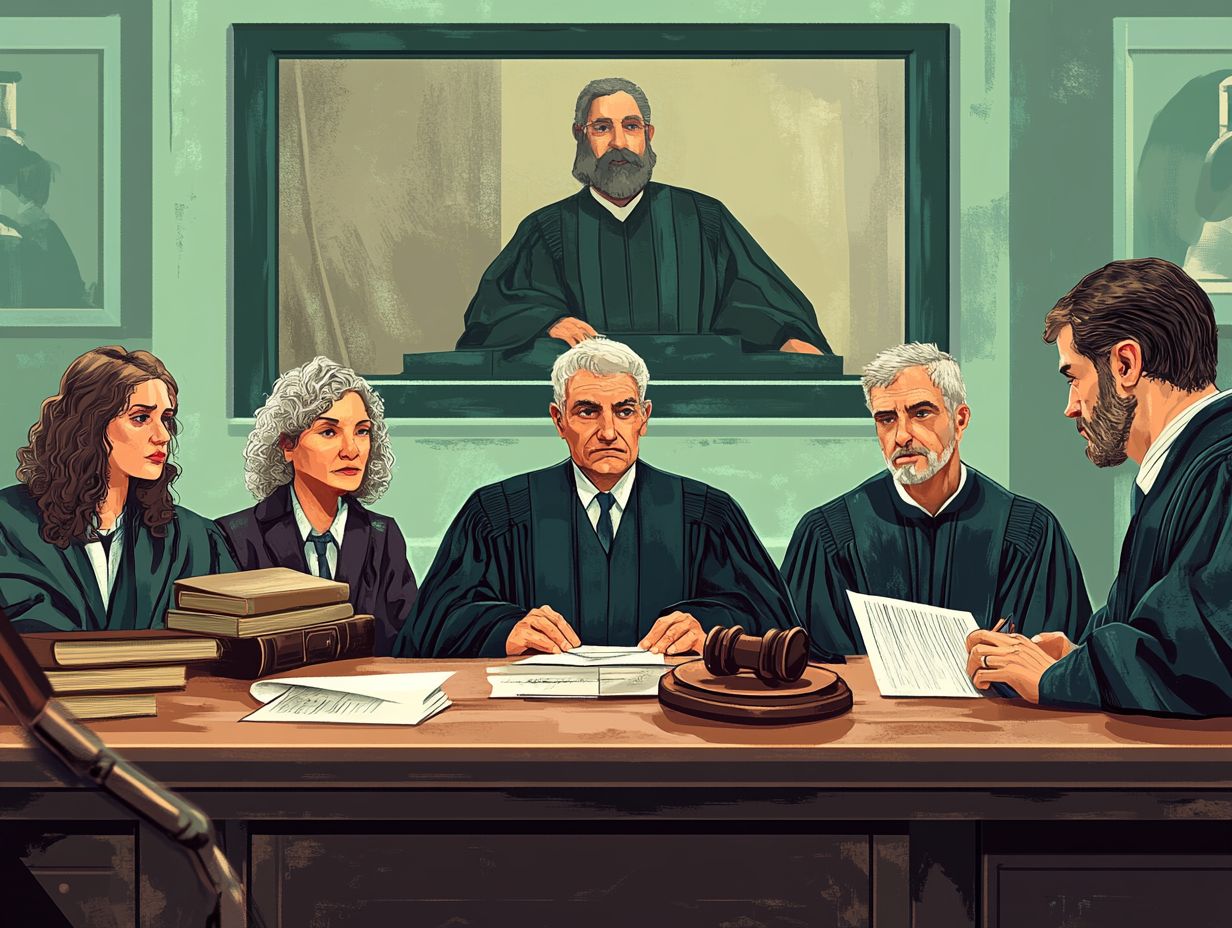
An accused infringer is a party facing legal action for allegedly violating someone else’s intellectual property.
Navigating this complex landscape can feel overwhelming, as the stakes are high and the implications of such allegations can deeply affect business operations and reputation. You have the right to seek legal counsel, which is essential for crafting a strong defense strategy against these claims.
It’s crucial to assess the risks associated with litigation. The potential fallout from losing an infringement case could involve significant financial damages and injunctions that might hinder your ability to operate.
By understanding the full spectrum of these risks, you enable yourself to make informed decisions, considering options that could help mitigate the impact of an unfavorable ruling.
5. Legal Counsel
Effective legal counsel is vital for navigating IP litigation successfully, as they can make all the difference. For those looking to excel in this field, understanding the 5 key skills for aspiring IP litigation lawyers is essential to winning your case.
Legal counsel plays a critical role in IP litigation, guiding you through the intricate legal frameworks surrounding intellectual property, including patents, copyrights, and trademarks.
Their responsibilities go beyond just offering legal advice; they re key in assembling litigation teams finely tuned to the specific nuances of your case. A thorough analysis of your claims is essential, allowing them to pinpoint strengths and weaknesses of the arguments on the table.
This analysis helps in crafting effective strategies and prepares you for the possibility of jury trials, where the subtleties of each argument can dramatically influence the outcome.
Experienced patent attorneys bring the insight and tactics needed to manage legal costs effectively, ensuring that your resources are used wisely while maximizing the chances of achieving a favorable resolution.
What Is an IP Litigation Case and When Does It Occur?
An IP litigation case emerges when a dispute over intellectual property rights prompts one party to assert infringement claims against another, leading to legal proceedings in civil court to address matters concerning patents, copyrights, and trademarks.
These disputes can arise from various situations, such as the unauthorized use of patented technology, the copying of distinctive brand logos, or the infringement of copyrighted materials in media like music and literature.
In these instances, the entity asserting its rights may contend that their innovations or creations are being exploited without consent, jeopardizing their market position and financial health.
The legal framework governing these issues consists of statutory laws and regulations that provide the foundation for resolving claims, frequently relying on precedents from earlier cases.
Given the intricacy of these disputes and the considerable financial implications involved, pursuing litigation becomes an essential strategy to safeguard intellectual property, nurturing a competitive and innovative environment.
What Are the Steps Involved in an IP Litigation Case?
In an IP litigation case, you’ll typically navigate several key steps. This starts with initiating a lawsuit, followed by exchanging pleadings, engaging in discovery, and potentially heading to trial in a civil court. Understanding the 5 major challenges in IP litigation today can also help you prepare for what lies ahead.
Each stage requires careful legal planning and strict adherence to procedural rules. After filing the initial complaint, you exchange detailed pleadings that clarify your position and outline the issues at stake.
This phase is critical for establishing the tone of the litigation. It often includes counterclaims that can add layers of complexity to the case. Once you settle the pleadings, the discovery phase then begins.
During discovery, both sides gather evidence, depose witnesses, and exchange documents to strengthen their respective cases. The choices you make here are crucial; effective discovery efforts can significantly sway the trial’s outcome.
If your case progresses to a jury trial, the legal strategies you employ during opening statements, witness examination, and closing arguments will be essential in persuading the jury and securing a favorable judgment.
What Are the Possible Outcomes of an IP Litigation Case?
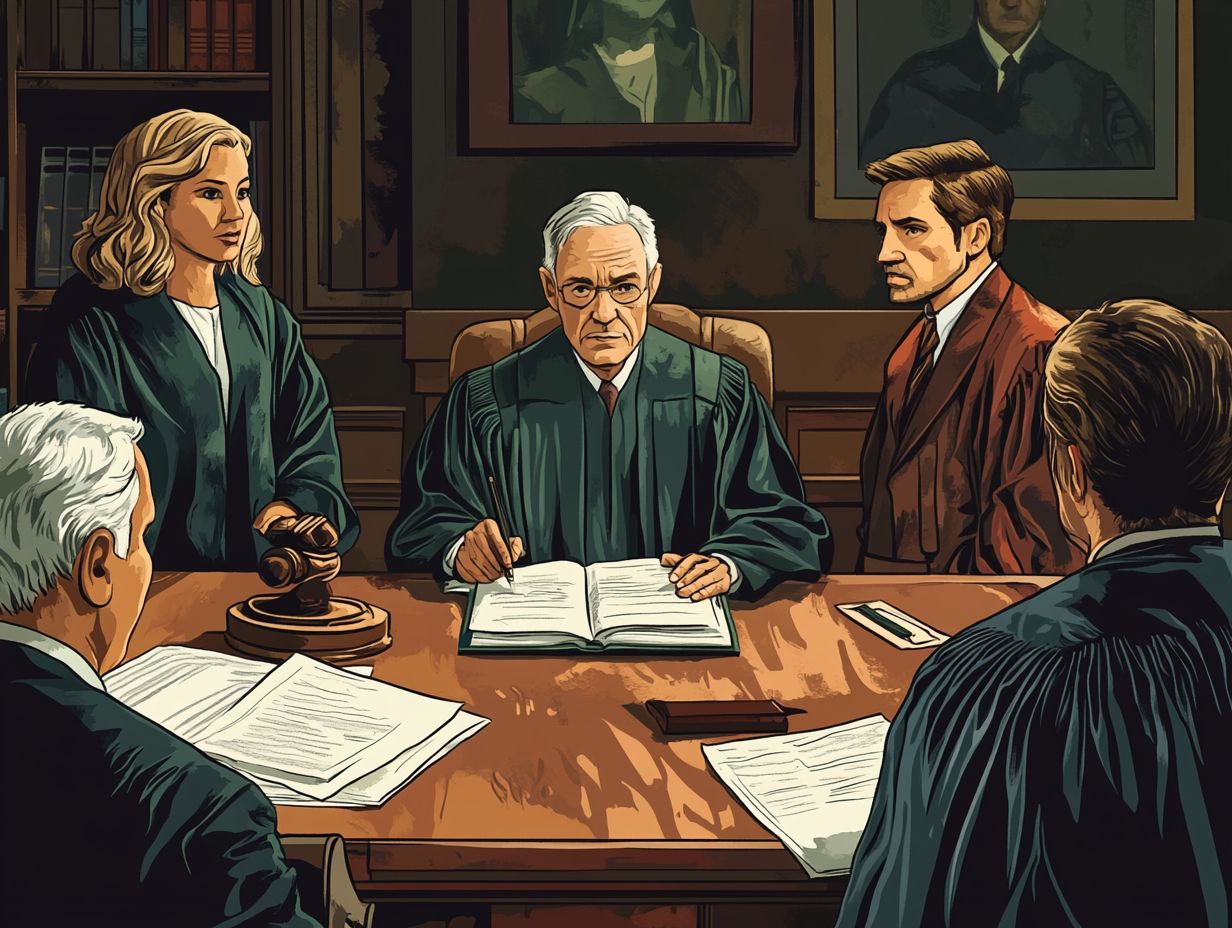
The possible outcomes of an IP litigation case can vary significantly. They can swing from favorable judgments that award financial damages to dismissals of infringement claims. These results hinge on the judicial decisions made throughout the litigation process.
Your strategies will shape these outcomes. For example, a court may grant an injunction, which is a court order to stop a defendant from utilizing patented technology. Meanwhile, a well-negotiated settlement could lead to a resolution that benefits both sides, ultimately saving you time and legal costs.
Factors such as the strength of the evidence you present, the expertise of your legal team, and prior rulings in similar cases heavily influence the results. Ultimately, these outcomes can dramatically shape your business future!
How Can a Business Protect Itself from IP Litigation?
You can protect your business from potential pitfalls of IP litigation by implementing proactive strategies. Conduct thorough risk assessments and seek legal representation to navigate the complexities of intellectual property rights.
To further safeguard your interests, establish comprehensive licensing agreements that clearly outline usage rights and obligations.
Regular training sessions can educate your employees about the nuances of trade secrets. Emphasize the importance of confidentiality and the serious consequences of leaks.
By actively cultivating a unique brand identity and ensuring your intellectual property remains distinct, you can significantly reduce the likelihood of unintentional infringement.
Combining these measures creates a robust framework that deters potential litigation and fosters a culture of respect for intellectual property within your organization.
What Are the Common Mistakes Made in IP Litigation Cases?
Common mistakes in IP litigation can lead you down a treacherous path, resulting in unfavorable outcomes. Failing to prepare a claims analysis, ignoring procedural timelines, and underestimating the complexities of necessary legal strategies can significantly impact your case.
These oversights can undermine your position, making it challenging to achieve a favorable resolution. For instance, you might rush to file a complaint without thoroughly assessing the merits of your claims, only to face an early dismissal. Missing crucial deadlines could lead to irrevocable losses, such as being unable to submit essential evidence or counterclaims.
To steer clear of these pitfalls, invest time in diligent research and strategic planning. Engage competent legal counsel who understands the intricacies of intellectual property law. Adopt robust project management practices to meticulously track timelines and milestones.
This proactive approach will enhance your chances of success in the complex world of IP litigation.
How Can Legal Counsel Help in an IP Litigation Case?
Let s explore how legal counsel can boost your success in intellectual property (IP) litigation! Legal counsel can greatly enhance your chances of success in an IP litigation case by building strong litigation teams, creating effective legal plans, and providing professional advice throughout every phase of the litigation process.
They prepare essential documents, such as pleadings (official documents filed in court) and motions, which are crucial for constructing a robust case.
Legal experts often step in to negotiate with opposing parties, facilitating settlements that can save you both time and money.
Skilled legal representation is critical in civil court. Attorneys passionately advocate on your behalf, presenting evidence and effectively arguing points of law.
This comprehensive support ensures that all procedural requirements are meticulously met and plays a significant role in influencing the outcome of your case.
Frequently Asked Questions
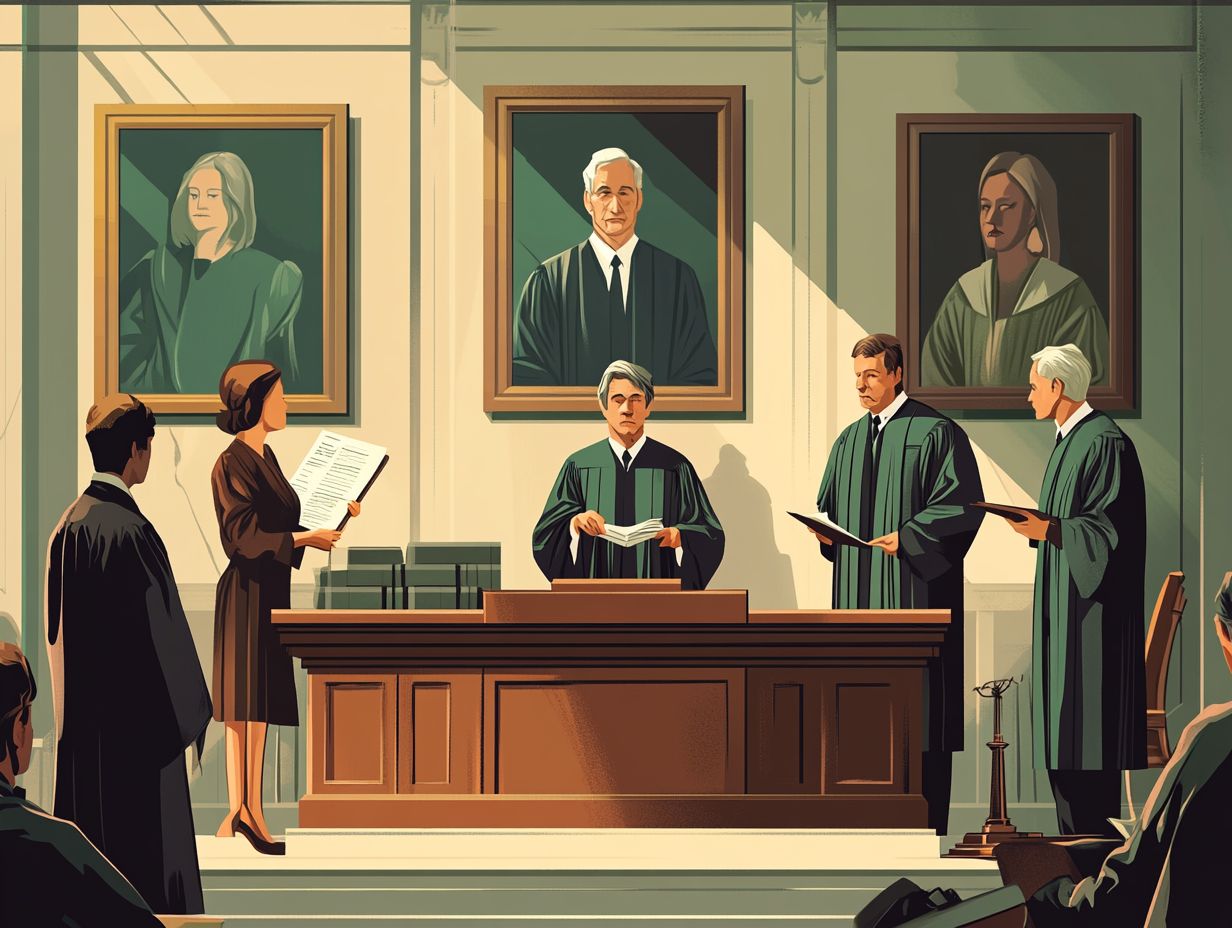
Who are the key players in an IP litigation case?
The key players in an IP litigation case typically include the plaintiff, defendant, judge, jury, and expert witnesses, as highlighted in the 5 notable figures in IP litigation history.
What is the role of the plaintiff in an IP litigation case?
The plaintiff in an IP litigation case is the individual or company bringing the lawsuit against the defendant for alleged infringement of their intellectual property rights, often highlighted in the 5 key takeaways from recent IP litigation cases.
What is the role of the defendant in an IP litigation case?
The defendant in an IP litigation case is the individual or company being sued for allegedly infringing on the plaintiff’s intellectual property rights. Understanding the insights gained from such situations can be valuable; for instance, exploring the 5 lessons learned from major IP litigation cases can provide helpful context.
What is the role of the judge in an IP litigation case?
The judge in an IP litigation case oversees the legal proceedings, ensuring that both parties follow the rules and procedures, and ultimately makes a decision on the outcome of the case.
What is the role of the jury in an IP litigation case?
The jury in an IP litigation case is responsible for reviewing the evidence presented and making a decision on the outcome of the case. In some cases, a jury may not be present, and the judge will make the final decision.
What is the role of expert witnesses in an IP litigation case?
Expert witnesses in an IP litigation case have specialized knowledge or experience in a particular field related to the case. They provide their expert opinions and analysis of the evidence presented in court.

